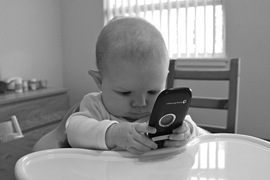
A lot of us are buying smart phones and tablets for our personal use and want to use them at work. They offer a lot of productivity gains and just make life easier. Why should I carry 2 phones or use something that’s not current. Years ago I had a Blackberry phone that my employer gave me. The iPhone had just come out and it didn’t have any apps yet. Android phones were still a pipe dream. My Blackberry did what I needed it to do and I was happy. I could send email, update my calendar and do some basic internet activities.
Fast forward to today. If my employer offered me a Blackberry, I would say “No thanks. I prefer to use my own.” The devices I own are better than what I am being offered. I am used to them and they make my work and personal life easier. Like it or not, I am connected constantly. Why should I give up my mobile device for something that doesn’t give me what I need?
A lot of companies are embracing this Bring Your Own Device (BYOD) trend. Rather than forcing everyone to use the “corporate” standard, employers are letting employees use their own devices. Some executives are loving this and some hate it. The concern is that confidential business information could be taken from unprotected devices. Data breaches are pretty easy if you just pick up a mobile device with no password or any type of security.
Rules about the use of personal devices vary widely. Some companies permit it as long as the device meets certain security requirements. That typically means passwords and the ability to remotely wipe the device of data if it’s lost or stolen. Others just say No or they are working on it. Let’s face it, the world is mobile. We want our devices to stay in contact wherever we are and businesses need to figure out a way to let us work without compromising security.
Research by McAfee and the National Cyber Security Alliance has found that nearly three out of four adults fail to protect their smartphones with security software. Many don’t even use a simple password to get into it. You can imagine these lax habits don’t make many companies too willing to let employees use their own devices.
“It’s working very well,” said Steve Martino, vice president of information security at San Jose-based Cisco, where a little less than half of the company’s employees use their personal devices. Cisco created a mobile access security policy that lets employees use devices as long as they meet a set of criteria, such as encryption, remote wipe, VPN access, etc.
If you don’t have a BYOD or mobile access policy, you need to think about it, since employees will find a way to circumvent security. The graphic below gives a current picture of the BYOD trend and some great tips for 2012. Protecting your corporate data and documents is critical to your company. Letting people use devices that make them comfortable and productive is very important. Determine how to marry the two and you will satisfy both needs.
Photo credit futurestreet


